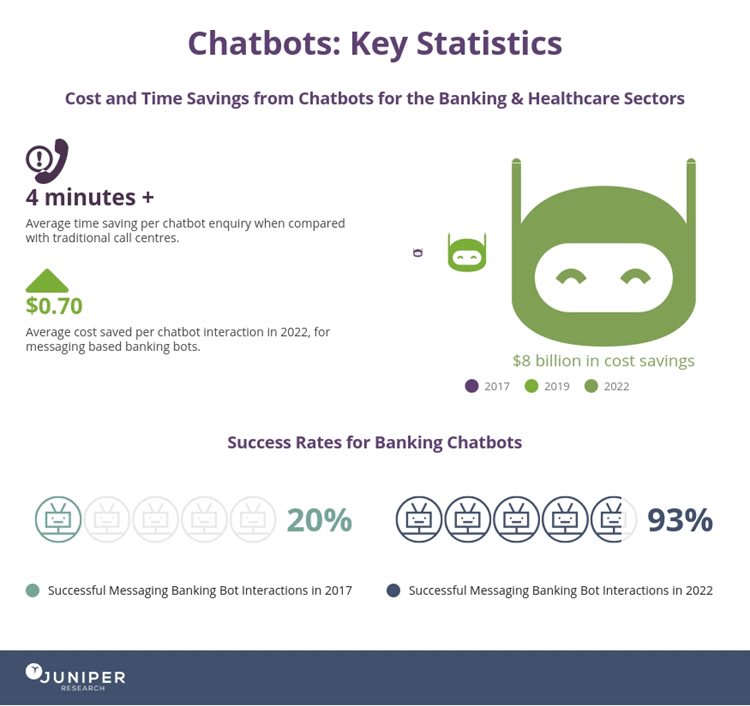As the world becomes more attuned to chatbots, both the customer experience and the role of people working in customer service will evolve. This is applicable in both B2C and B2B environments.
While the increasing pervasiveness of sophisticated chatbots may reduce the number of jobs available in the customer service field, on aggregate bots will make customer service jobs easier to learn and more rewarding in many aspects.
Chatbots have actually been around for a while. The first known chatbot, ELIZA, was built in 1966 by Joseph Weizenbaum of MIT. With machine learning and natural language processing, the chatbots we interact with today juxtapose strongly with the front-loaded, scripted responses of early chatbots that we may recall.
Armed with today’s technological advancements, chatbots are much more user friendly and can carry out tasks and answer questions without pre-programming. Users don’t need to know the proper diction and syntax to get the answers they need. They can simply ask a question as they would say them conversationally. And this is why one of the leading use cases for chatbots is in customer service.
Scaling faster
Early adopters of chatbots typically deployed them to cut down on customer service overhead. While this still remains a primary driver, with modern chatbots there are a multitude of factors in play.
By 2022, some estimate chatbots will save businesses over a collective $8 billion in expenses. While the figure represents a gross estimate, it’s far from arbitrary. Introducing chatbots at the onset of a business can help relieve some of the growing pains (including costs) associated with taking on more customers quickly in new markets.

As chatbots can take care of more inquiring customers and convert more leads to sales, companies can focus on other important aspects of scaling like technology, product development and hiring talent all while saving in other areas.
Immediate, 24/7 coverage
Chatbots can assist customers immediately without needing to wait on hold or in a queue. This not only improves the customer service experience, but also secures more sales.
In an online environment, if the customer can’t find an answer or a product they are looking for within seconds, they will likely navigate away from the site. If a chatbot can engage them and lead them to what they’re searching for, they will likely stay on the site longer and potentially purchase a product.
More importantly, this level of customer service works 24/7 with chatbots. Companies may no longer need call centers stationed halfway across the world to handle customer service after hours.
Around the clock customer service can greatly improve customer loyalty as well. The convenience factor is an essential component of the customer experience. This is especially true for the younger, more stereotypically impatient generations.
With the power of the internet at our fingertips, brands that can deliver answers immediately will remain abreast of consumer expectations.
Better customer engagement
As consumers become more accustomed to chatbots, the more likely they are to engage with them.
Most customer-facing bots are programmed to engage in a positive tone while providing exact, concise answers. A customer will likely immediately turn away if met by a customer service agent with a negative approach or demeanor. Thus, the level of initial customer engagement will likely be positive and helpful.
Bots also address another customer engagement issue pertinent in today’s global marketplace: the language barrier. Chatbots programmed to translate can engage customers who may not speak the same language as the customer service agents making it easier to expand market share globally.
Serving as a job aid for any employee
Most businesses turn to chatbots immediately for customer facing purposes. However, they can also greatly enhance both the customer experience and job satisfaction of the agent when used internally.
Companies often store information among various internal systems. Thus, quickly pulling up information pertinent to a customer service query can often be easier said than done. Even if the agent knows immediately where to look, it may take several minutes to load or locate the answer.
Chatbots synced to internal programs like CRM, ERP or accounting systems can help locate customer information immediately while the agent converses with the customer. This level of convenience can aid nearly any position in a company.
Chatbots can serve as a convenient sidekick for seasoned employees while at the same time help less experienced employees feel more confident and competent faster than they would otherwise. Companies can also reduce the amount of time it takes to train new customer service agents when they can get up to speed faster with the aid of a bot.
Improved work satisfaction
Anyone can lose their patience when asked the same questions over and over again. Although they’re helping customers, this repetitiveness can become numbing and the job can feel redundant.
While some people may prefer simple tasks, most customer service agents find low job satisfaction when answering repetitive questions and higher job satisfaction when solving more nuanced problems. By allowing chatbots to answer typical high-volume, simple questions, customer service agents will then add more value by taking on mostly complex or personal queries.
By working on more advanced customer inquiries, customer service agents will naturally advance their acumen in their field making them not only more valuable to the customer but to the organization they work for. By accumulating more knowledge they may become more eligible for higher positions in their companies.
According to a CCW executive survey, 33% of respondents cite improving customer service job satisfaction as a top priority in 2018. More fulfilled employees lead to lower turnover rates which prove costly both monetarily and from a morale perspective.
As such, the implications of chatbots in customer services far exceed operational efficiency and higher sales conversions. They also can enable career development and foster greater job satisfaction.
Start using Guild for free or contact us if you want to know more or have questions.